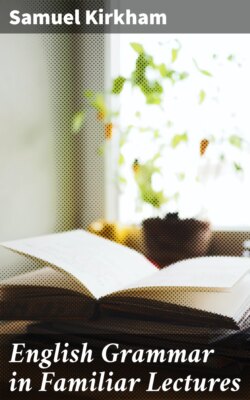Читать книгу English Grammar in Familiar Lectures - Samuel Kirkham - Страница 28
На сайте Литреса книга снята с продажи.
NOTES.
Оглавление1. Some nouns are used only in the singular form; as, hemp, flax, barley, wheat, pitch, gold, sloth, pride, honesty, meekness, compassion, &c.; others only in the plural form; as, bellows, scissors, ashes, riches, snuffers, tongs, thanks, wages, embers, ides, pains, vespers, &c.
2. Some words are the same in both numbers; as, deer, sheep, swine; and, also, hiatus, apparatus, series, species.
3. The plural number of nouns is generally formed by adding s to the singular; as, dove, doves; face, faces; but sometimes we add es in the plural; as, box, boxes; church, churches; lash, lashes; cargo, cargoes.
4. Nouns ending in f or fe, are rendered plural by a change of that termination into ves; as, half, halves; wife, wives: except grief, relief, reproof, and several others, which form their plurals by the addition of s. Those ending in ff, have the regular plural; as, ruff, ruffs; except staff, staves.
5. Nouns ending in y in the singular, with no other vowel in the same syllable, change it into ies in the plural; as, beauty, beauties; fly, flies. But the y is not changed, where there is another vowel in the syllable; as, key, keys; delay, delays; attorney, attorneys; valley, valleys; chimney, chimneys.
6. Mathematics, metaphysics, politics, optics, ethics, pneumatics, hydraulics, &c. are construed either as singular or plural nouns.
7. The word news is always singular. The nouns means, alms, and amends, though plural in form, may be either singular or plural in signification. Antipodes, credenda, literati, and minutiæ are always plural. Bandit is now used as the singular of Banditti.
8. The following nouns form their plurals not according to any general rule; thus, man, men; woman, women; child, children; ox, oxen; tooth, teeth; goose, geese; foot, feet; mouse, mice; louse, lice; brother, brothers or brethren; cow, cows or kine; penny, pence, or pennies when the coin is meant; die, dice for play, dies for coining; pea and fish, pease and fish when the species is meant, but peas and fishes when we refer to the number; as, six peas, ten fishes.
9. The following compounds form their plurals thus: handful, handfuls; cupful, cupfuls; spoonful, spoonfuls:—brother-in-law, brothers-in-law; court-martial, courts-martial.
The following words form their plurals according to the rules of the languages from which they are adopted.
| Singular | Plural. |
| Antithesis | antitheses |
| Apex | apices |
| Appendix | {appendixes or |
| {appendices | |
| Arcanum | arcana |
| Automaton | automata |
| Axis | axes |
| Basis | bases |
| Beau | {beaux or |
| {beaus | |
| Calx | {calces or |
| {calxes | |
| Cherub | {cherubim or |
| {cherubs | |
| Crisis | crises |
| Criterion | criteria |
| Datum | data |
| Diæresis | diæreses |
| Desideratum | desiderata |
| Effluvium | effluvia |
| Ellipsis | ellipses |
| Emphasis | emphases |
| Encomium | {encomia or |
| {encomiums | |
| Erratum | errata |
| Genius | genii [2] |
| Genus | genera |
| Hypothesis | hypotheses |
| Ignis fatuus | ignes fatui |
| Index | {indices or |
| {indexes[3] | |
| Lamina | laminae |
| Magus | magi |
| Memorandum | {memoranda or |
| {memorandums | |
| Metamorphosis | metamorphoses |
| Parenthesis | parentheses |
| Phenomenon | phenomena |
| Radius | {radii or |
| {radiuses | |
| Stamen | stamina |
| Seraph | {seraphim or |
| {seraphs | |
| Stimulus | stimuli |
| Stratum | strata |
| Thesis | theses |
| Vertex | vertices |
| Vortex | {vortices or |
| {vortexes |
